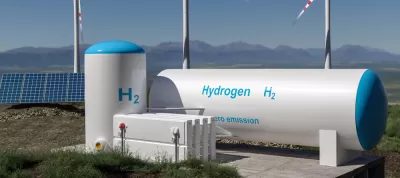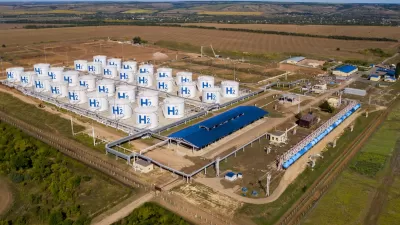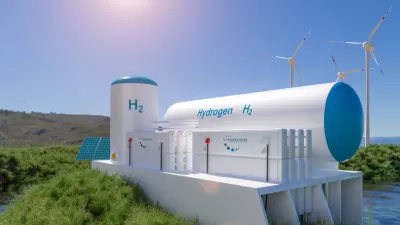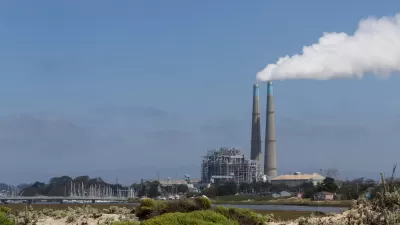The U.S. Department of Energy announced two new programs last month that are funded by the $1.2 trillion Infrastructure Investment and Jobs Act: $7 billion to create regional ‘hydrogen hubs’ and $4.9 billion to ‘manage and store carbon pollution.’

“The U.S. Department of Energy today opened applications for the $7 billion program to create regional clean hydrogen hubs (H2Hubs) across the country, which will form a critical arm of America's future clean energy economy,” states the department's news release (source article) dated September 22.
As part of a larger $8 billion hydrogen hub program funded through President Biden’s Bipartisan Infrastructure Law, the H2Hubs will be a central driver in helping communities across the country benefit from clean energy investments, good-paying jobs, and improved energy security – all while supporting President Biden’s goal of a net-zero carbon economy by 2050.
The program “will be one of the largest investments in DOE history” and will be managed by DOE’s Office of Clean Energy Demonstrations established a month after the infrastructure bill was signed to accelerate clean energy technologies.
For this initial funding opportunity launch, DOE is aiming to select six to ten hubs for a combined total of up to $7 billion in federal funding.
As part of the Department’s commitment to accelerating the national deployment of clean hydrogen fuel, DOE also released a draft of the National Clean Hydrogen Strategy and Roadmap [121-pg. PDF] for public feedback.
Clean hydrogen should not be confused with so-called green hydrogen made strictly from electrolysis using renewable power. Page 6 of the aforementioned document indicates that clean hydrogen can additionally be sourced from natural gas, coal, nuclear energy, and biomass.
Robert Walton, an energy reporter for Utility Dive, dove into the document further, providing a more precise description of clean hydrogen: It sets “a target of 4 kg CO2e per kgH2 for lifecycle greenhouse emissions associated with hydrogen production,” he wrote on September 23.
Carbon Management
The day after releasing the new $7 billion hydrogen program, the Energy Department “announced a nearly $4.9 billion set of funding opportunities to bolster investments in the carbon management industry and to significantly reduce carbon dioxide (CO2) emissions released into the atmosphere through power generation and industrial operations.”
“Nearly every climate model makes clear that we need carbon management technology—especially in hard to decarbonize sectors and heavy industries such as steel and cement production—to tackle the climate crisis,” said U.S. Secretary of Energy Jennifer M. Granholm.
The September 23 press release details the three funding opportunity announcements that collectively tackle climate-changing carbon dioxide emissions:
- Carbon Storage Validation and Testing
- Carbon Capture Demonstration Projects Program
- Carbon Dioxide Transport Engineering and Design
Related:
- Energy Department Resumes Loan Program with Hydrogen Storage, June 21, 2022
- Biden Commits Federal Government to Carbon Neutrality, December 8, 2021
- More Details of the $1.2 Trillion Federal Infrastructure Bill, November 21, 2021
-
Green Hydrogen, Plus Storage, Key to Los Angeles' Plan for Carbon-Free Electricity, December 22, 2019

Planetizen Federal Action Tracker
A weekly monitor of how Trump’s orders and actions are impacting planners and planning in America.

Map: Where Senate Republicans Want to Sell Your Public Lands
For public land advocates, the Senate Republicans’ proposal to sell millions of acres of public land in the West is “the biggest fight of their careers.”

Restaurant Patios Were a Pandemic Win — Why Were They so Hard to Keep?
Social distancing requirements and changes in travel patterns prompted cities to pilot new uses for street and sidewalk space. Then it got complicated.

Platform Pilsner: Vancouver Transit Agency Releases... a Beer?
TransLink will receive a portion of every sale of the four-pack.

Toronto Weighs Cheaper Transit, Parking Hikes for Major Events
Special event rates would take effect during large festivals, sports games and concerts to ‘discourage driving, manage congestion and free up space for transit.”

Berlin to Consider Car-Free Zone Larger Than Manhattan
The area bound by the 22-mile Ringbahn would still allow 12 uses of a private automobile per year per person, and several other exemptions.
Urban Design for Planners 1: Software Tools
This six-course series explores essential urban design concepts using open source software and equips planners with the tools they need to participate fully in the urban design process.
Planning for Universal Design
Learn the tools for implementing Universal Design in planning regulations.
Heyer Gruel & Associates PA
JM Goldson LLC
Custer County Colorado
City of Camden Redevelopment Agency
City of Astoria
Transportation Research & Education Center (TREC) at Portland State University
Camden Redevelopment Agency
City of Claremont
Municipality of Princeton (NJ)





























